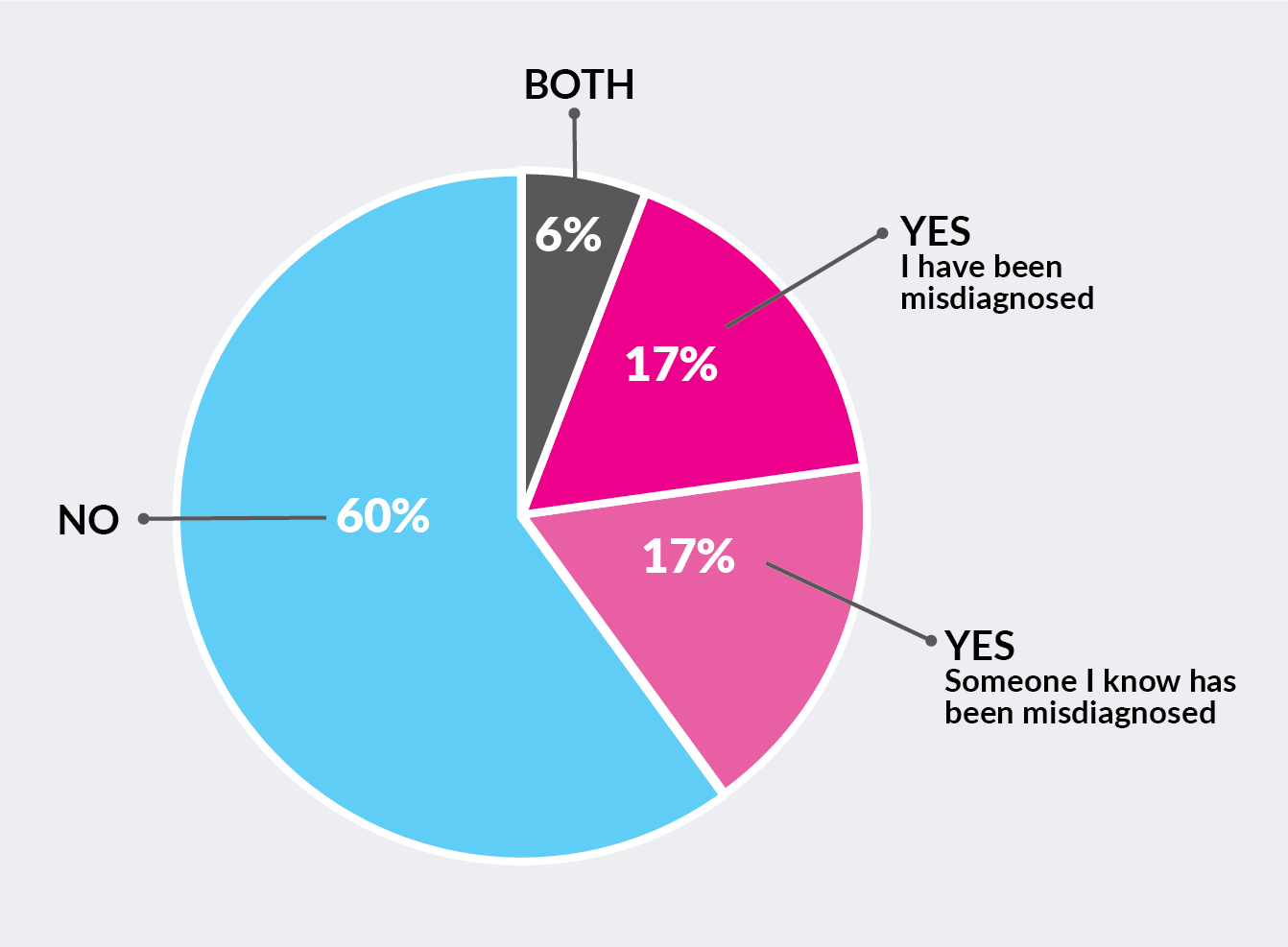3 minute read
It might be the year 2020, but when it comes to getting the right healthcare, gender equality hasn’t quite evolved yet. We haven’t been able to reduce the occurrence of healthcare errors, misdiagnoses and wasted spending either.
To get a better sense of how common misdiagnosis is today, we recently surveyed 1,000 consumers and asked them this question:
Have you or someone you know been misdiagnosed by a medical professional?
An astounding 40%1 of them replied yes.

Not only is misdiagnosis prevalent, but it happens to women at an alarmingly higher rate than men.
- An article on Prevention.com cited that women are 50% more likely than men to get the wrong diagnosis after a heart attack
- WebMD.com writes that women are 30% more likely than men to have symptoms of a stroke misdiagnosed
- Mental Health America completed a survey on depression in women and found that women experience depression at roughly twice the rate of men, and women attempt suicide twice as often as men
Today in the US, women are living their lives with a greater likelihood of misdiagnosis, but at what cost?
Connecting Misdiagnosis and Cost
When you consider that $1 out of every $4 spent annually on healthcare in the US is being wasted, a total estimated at $265 billion2 (with a “b”), it’s no wonder misdiagnosis is reaching epidemic proportions . . . both for our health and for our wallets.
Beyond the financial cost involved in wasted medical procedures, there’s also the cost of lost productivity which impacts both patients and their employers alike. Employers lose twice – once in paying for rising healthcare costs and again in lost productivity when their workers are unhealthy and unable to work.
We should not discount the physical and emotional toll that delaying proper treatment takes on a patient. Many illnesses, like rheumatoid arthritis that primarily impact women, often go years before being accurately diagnosed. It’s not uncommon for a woman suffering from endometriosis to be told she’s got a bad case of PMS for years before proper diagnosis, too.
How Did This Gender Gap Happen?
Why do women get misdiagnosed more than men? Many theories float around – a popular one is that women are viewed by doctors as more emotional. Despite the gains for gender equality in a lot of areas, in health care, we are still struggling to be taken seriously when complaining of pain or other symptoms.
As women, we sometimes dismiss our symptoms because we don’t want to be a bother to others. When we are caring for both parents and kids, making time to see the doctor can become an even bigger barrier to getting the right care. When we finally get to the doctor to receive a diagnosis, we might take the first diagnosis as the truth while crossing “see the doctor” off our growing to-do list.
Taking Charge of Your Health
There are many women who inspire me personally, but in my opinion, nobody is a stronger advocate for women’s health than Cindy Eckert. You might not know her name, but you may have heard of Addyi, often dubbed the “Female Viagra”.
By 2015, the FDA had approved 26 sexual dysfunction drugs for men, yet not a single drug for women. In fact, the subject of female sexual dysfunction was dismissed by committee members as a joke. That is, until Cindy Eckert entered the picture by proceeding to fight and push Addyi through the FDA approval process. Recognizing the importance of conversation as a catalyst for women to take action, Cindy has continued to make it her mission to talk about women’s sexual desire through her #WomenOnTop campaign.
We might not all have the desire to take on the FDA, but as women, we need to be our own biggest health advocates. Here are some simple guidelines you can follow:
- If you don’t feel right about a diagnosis, get a second opinion.
- If you have a question, do not be afraid to ask. If you don’t understand the answer, ask for an explanation.
- Know your options - the risks of both delaying and proceeding with the course of care, and the cost involved.
It might also be a good idea to do some research about your symptoms before you see the doctor. This does not mean self-diagnose; rather, become informed about your symptoms, so that you can present a full picture of your health situation when you’re with the doctor. Don’t leave anything out.
The staggering data around misdiagnosis in women is one of the reasons I’m glad that services like ours exist, to help me find the right doctor and sort through those who might not be delivering the best possible care.
Regardless of gender, we all deserve to have the best possible health. It’s beyond time to close the gender gap in healthcare. We can reduce pain, improve our health and lower wasted healthcare costs together.
Want to see more of what we learned when we surveyed 1,000 consumers? Click here.
1 ArmadaHealth Consumer Sentiment Survey, October 2019.
2 https://www.cnbc.com/2019/10/07/study-reveals-265-billion-wasted-on-health-care-each-year-in-us.html


